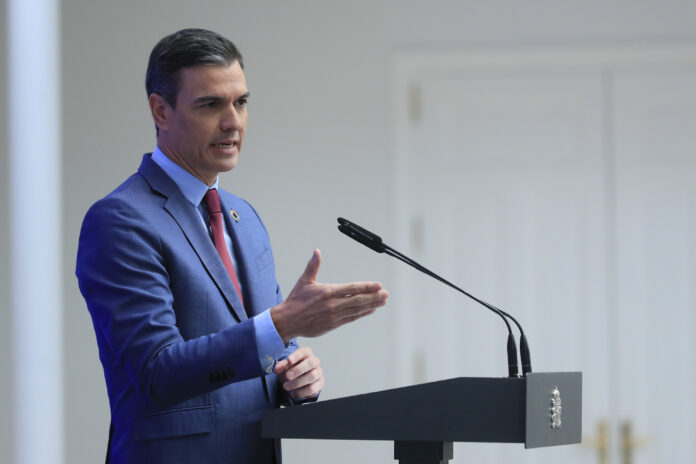The President of the Government, Pedro Sánchez, plans to travel to Moldova next Friday, June 3, to show solidarity with the country for its efforts in welcoming Ukrainian refugees and to support its territorial integrity against Russia.
Sánchez had planned to have traveled to Moldova and Poland on April 28 but postponed the trip to be able to attend the plenary session of Congress to vote on the decree with the measures to face the economic and social consequences of the war in Ukraine.
Finally, government sources have informed Efe that he plans to resume next week the part of the trip corresponding to Moldova, in whose capital, Chisinau, and while waiting to finalize the official agenda, he is expected to meet with the main authorities of the country in which it will be the first visit of a president of the Spanish Government and on the 30th anniversary of the establishment of diplomatic relations.
Its prime minister, Natalia Gavrilita, participated this week in the World Economic Forum in Davos, which was also attended by the chief executive.
Sánchez was in kyiv on April 21 to convey in person to the President of Ukraine, Volodímir Zelenski, the support of Spain in the face of the Russian invasion, and also wants to express that solidarity with countries such as Moldova that have been especially affected by the massive arrival of Ukrainian refugees.
On the trip that was suspended, a visit to the open reception center in Chisinau was scheduled, in addition to holding meetings with Gavrilita and with the country’s president, Maia Sandu.
Spain has been approving humanitarian aid in response to the situation in Ukraine and part of it has been directed to Moldova to collaborate in managing the arrival of refugees.
There are currently some 80,000 Ukrainian refugees out of a total of almost 425,000 who arrived in the country after the Russian invasion, and Spain has participated in the distribution of the people who had arrived in Moldova.
Since the beginning of the Russian invasion of Ukraine, there has been international concern about the possibility that the conflict could spread to Moldova, and countries such as the United Kingdom have raised the possibility of equipping the country with NATO-standard weapons.
A possibility to which Russia reacted by reminding Chisinau of its neutral status according to its own Constitution.
When Sánchez was going to travel in April, Moldova was also experiencing a moment of special tension since a series of terrorist attacks had been perpetrated in the self-proclaimed Moldovan republic of Transnistria, with a Russian-speaking majority and bordering Ukraine.
Transnistria, a territory of barely half a million inhabitants and mostly Slavs, broke ties with Moldova after an armed conflict (1992-1993) in which it had Russian help.
Since the end of that conflict, which cost the lives of hundreds of people, Moldova has advocated the integration of the two territories divided by the Dniester River, something the separatists have always refused to do.
Under the Agreement for the Peaceful Solution of the Transnistria conflict signed in July 1992, Russia posted 2,400 troops (which have been progressively reduced) to guarantee peace in the area and protect an arsenal of the former Soviet Union in which estimates that there are currently some 20,000 tons of weapons and ammunition left.
Moldova asks for the withdrawal of Russian troops and the arsenal, but Moscow refuses, assuring that the presence of its troops is legitimate and only when there is a political agreement between Chisinau and Tiraspol will it be possible to talk about the end of the peace mission.
The position that Sánchez will reiterate on his trip, according to government sources, is one of full support for the territorial integrity and sovereignty of Moldova within the framework of its internationally recognized borders, including Transnistria.
It will also back its efforts to join the EU after the country submitted its formal request to do so in March, just days after the start of the Ukraine invasion.
Brussels hopes to finalize the report on the situation of Moldova to become a candidate country before the European Council on June 23-24.
Sánchez’s visit, according to the Government, will also serve to strengthen relations with Moldova, a country in which Spain does not have an embassy and diplomatic affairs are managed from the Bucharest legation.
But the Government is studying the possibility of opening what is called a diplomatic antenna, a person attached to the embassy in charge of the relationship and who is dedicated to managing current affairs.
Conforms to The Trust Project criteria








